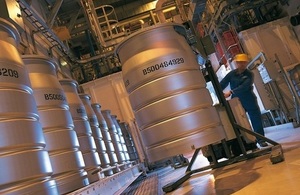Collaborative decommissioning research TRANSCENDS the individual approach
A £9.4 million research programme will link experts from the nuclear industry with UK academics and PhD students to wrestle with some of the challenges in dealing with radioactive waste.

Integrated waste management is one of the NDA's key themes
The research will span 40 projects lasting up to 4 years each, helping to build the next generation of nuclear experts as well as developing technical solutions.
Building on a core grant of £4.6 million from the Engineering & Physical Sciences Research Council (EPSRC), AWE, Cavendish Nuclear, Low Level Waste Repository Ltd, National Nuclear Laboratory, Radioactive Waste Management Ltd, Sellafield Ltd and TUV SUD Nuclear Technologies are all supporting the programme through direct funding and/or supervisory expertise, use of facilities and researcher training, resulting in the total funding pot of more than £9 million.
Those working on the projects will include a mixture of PhD students and Post-Doctoral Researchers, each with academic and industrial supervisors, the latter being technical experts from within industry to ensure maximum 2-way knowledge transfer.
Known as TRANSCEND (Transformative Science and Engineering for Nuclear Decommissioning), the work builds on 2 previous programmes, DIAMOND and DISTINCTIVE, the former having concluded in 2013, with the latter due to finish in early 2019.
The consortium of 11 universities will be led by the University of Leeds and includes:
- Imperial College London
- Lancaster University
- Queen’s University Belfast
- University of Birmingham
- University of Bristol
- University of Leeds
- University of Manchester
- University of Sheffield
- University of Southampton
- University of Strathclyde
- University of Surrey
The research topics to be explored by the TRANSCEND consortium align with the NDA’s key themes of:
- Integrated waste management
- Site decommissioning and remediation
- Spent fuel
- Nuclear materials
TRANSCEND’s work will build on the significant progress made in these areas by the DISTINCTIVE consortium, contributing to tackling the UK’s nuclear legacy.
NDA Research Manager Dr Rick Short said:
Our industry benefits hugely when high-level academic research is focused at some of the challenges we face in decommissioning our nuclear legacy. We welcome this collaboration and look forward to seeing the progress that these important projects will deliver. Equally valuable will be the development of knowledge and expertise for the participants – we hope their skills with be with us for many years ahead.
Jon Martin, Head of Research at RWM, said:
Research is critical to exploring and understanding all aspects of the science associated with a future geological disposal facility that will be required to keep radioactive waste safe for many thousands of years. We welcome the news that the TRANSCEND collaboration has received approval and look forward to working in partnership with the many world-class research institutions and industry representatives involved.
NNL’s Science Ambassador, Gareth Headdock, said:
As a national research lab, NNL will provide the key integrating interface between those carrying out the research and those needing solutions, to ensure they are aligned. This is primarily through the provision of industrial supervision and access to the world-leading facilities in our Central Laboratory on the Sellafield site.
We know that to achieve transformational developments in the way we approach waste management and decommissioning, we need to think differently, disrupt the established ways of working and collaborate with others like never before.
Geoff Randall, Senior Scientist at Sellafield Ltd, said:
The previous programmes have led directly to the development of new equipment like Acoustic Back Scattering technology that is being installed in a settling tank for Pile Fuel Storage Pond sludge removal. We’ve also been able to accelerate hazard reduction, partly as a result of fundamental research into Magnox Swarf Storage Silo materials, and prepare the next generation of engineers and scientist to face our challenges. We are pleased to be part of this exciting new programme.
Principal Investigator for the DISTINCTIVE and TRANSCEND programmes, Professor Michael Fairweather of the University of Leeds, said:
This research consortium represents an important activity in reinforcing the industry-academia links that have grown significantly in recent years, and provides key support to underpin an academic skill base in this crucial area for the UK. The world-leading team of academic experts provides both depth and breadth across all areas of current research need, and the strong support of our key industry partners validates the usefulness of the research programme we will undertake.